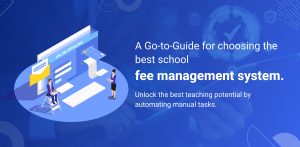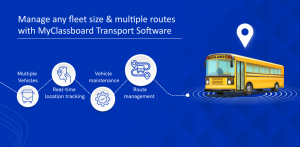A school transport management system is a subset of School ERP that deals with the planning, execution, and optimisation of everyday school activities with ease. In other words, it’s a logistics platform that enables users to manage, optimise and interact the daily operations of their school.
Transport Management is offered as a module within our school ERP and helps, schools and parents alike, track school buses integrated with Vehicle Tracking System (VTS). The ultimate goals of using School Transport Management System are to improve tracking for safety, efficiency by sending parents timely alerts, gain real-time vehicle data.
Typically, School TMS serves both parents and schools by building the gap and alerting parents when from the time bus leaves the school to the time it drops the child safely to school, as well as alerting school if a child misses their bus.
School Transportation Software has gained traction over the past decade, as it has emerged as a facilitator of seamless vehicle tracking and alerting (transportation) management. By enabling information updation with parents and schools, we have developed an efficient VTS integrated with RFID technology that is finding growing appeal. Furthermore, its functionalities make it suitable for schools that not only have fleets of school buses but also for those schools that may have basic vehicle tracking needs.
Benefits of GPS Tracking System for School Buses:
A fully deployed school transportation management system can benefit educational organisations in the following ways:
Ensure Child-Safety
Today, parents are in constant worry from the time their child leaves for school to the time they reach home safely. Parents do try and put their trust in the school authorities for their compliance with respect to vehicle operation and responsibility.
However, recent incidents have only ignited their apprehensions to a different level making them forgo trusting the school authorities.
Adding to this complex situation, is the lack of effective transport management for multiple groups of personnel, at multiple locations. This has posed a major challenge for schools.
With such unsatisfactory performance from school management, parents have decided to play an active role in real-time school bus tracking.
With this, parents can track the bus location and receive alerts at different points of time/location. This saves time and helps schools to take immediate action against any issue. Being able to monitor a child’s location at a touch has given parents a sense of security.
Track School Buses in Real-Time
A GPS vehicle tracking system enables live tracking of school buses and keeps parents updated all the time, from the time the bus leaves the school in the morning to the time the child reaches home, resulting in little to no waiting time.
Alert Parents and Schools alike
Parents are sent alerts to keep them updated about the bus’s location and ETA, reducing waiting time for both buses and parents (and students).
The GPS Tracking System alerts both parents as well as school management in case a child misses his/her school bus. This is to ensure that the child never goes out of notice.
Further, in the event a student getting down at the wrong stop, the school authorities and parents get instant alerts. This helps school management ensure strict compliance with safety measures.
Boost Fuel Efficiency
With an efficient VTS in place, fuel can be a cost-saving factor. Maintaining a record of various metrics & tracking school buses in real-time can significantly reduce the wasteful use of fuel.
Also reducing travel distance by better bus route management can minimise idling time, saving fuel and time.
Efficient Record Keeping
Record maintenance is crucial to see where the funds are being used and where they can be minimised. However, tracking vehicle data is a remarkable challenge for school management.
School Transport Management System helps the organisation in better record maintenance.
Concern for the Environment
It is on our part to come up with feasible alternatives to minimise the harm caused to the environment we live in. Reduce engine idling, utilise better/shorter bus routes contributing to less noise pollution, fewer smoke emissions and better fuel-efficiency.












